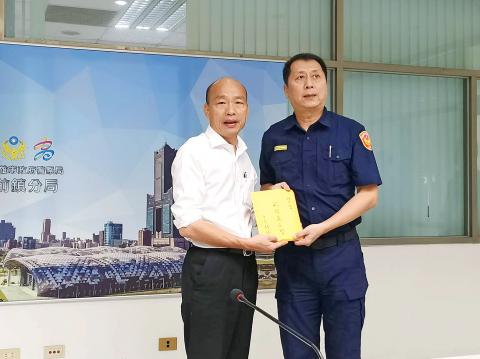Minister of the Interior Hsu Kuo-yung (徐國勇) yesterday visited Kaohsiung, the latest in a slew of top officials to visit the city in connection with a recent spate of violent incidents in the city.
Since a pet shop in Cianjhen District (前鎮) was vandalized on Tuesday, there have been intermittent street brawls near the store and a gun has been fired.
The incidents are reportedly linked to a dispute between two livestream hosts.

Photo: Huang Hsu-lei, Taipei Times
Twenty-five people have been detained, but no serious injuries were reported.
Earlier in the day, Kaohsiung Mayor Han Kuo-yu (韓國瑜) accused the Democratic Progressive Party government of politicizing crime ahead of next year’s presidential and legislative elections.
Han is the Chinese Nationalist Party’s (KMT) presidential candidate.
The city’s crime rate is down by 2 percentage points and its crime closure rate is up by 2 percentage points compared with the same period last year, Han said, adding that Kaohsiung has the third-highest closure rate among the nation’s six special municipalities.
“The government’s heavy-handed actions could hurt Kaohsiung’s image,” he said. “Who will take responsibility if the city loses investors or tourists?”
Hsu said that the spate of public disturbances left the central government with no option but to intervene.
“There have been brawls in Kaohsiung for three consecutive days, shots have been fired and police authority is under attack,” he said.
“We cannot allow … such incidents to spread... To that end, Criminal Investigation Bureau Commissioner [Huang Ming-chao (黃明昭)] and other officials have been dispatched to Kaohsiung” to hold a law enforcement conference, Hsu said.
Separately yesterday, President Tsai Ing-wen (蔡英文) said: “The Executive Yuan has acted appropriately by paying attention to law and order in the city and its actions are not motivated by any desire to interfere with Han.”

Nvidia Corp yesterday unveiled its new high-speed interconnect technology, NVLink Fusion, with Taiwanese application-specific IC (ASIC) designers Alchip Technologies Ltd (世芯) and MediaTek Inc (聯發科) among the first to adopt the technology to help build semi-custom artificial intelligence (AI) infrastructure for hyperscalers. Nvidia has opened its technology to outside users, as hyperscalers and cloud service providers are building their own cost-effective AI chips, or accelerators, used in AI servers by leveraging ASIC firms’ designing capabilities to reduce their dependence on Nvidia. Previously, NVLink technology was only available for Nvidia’s own AI platform. “NVLink Fusion opens Nvidia’s AI platform and rich ecosystem for

‘WORLD’S LOSS’: Taiwan’s exclusion robs the world of the benefits it could get from one of the foremost practitioners of disease prevention and public health, Minister Chiu said Taiwan should be allowed to join the World Health Assembly (WHA) as an irreplaceable contributor to global health and disease prevention efforts, Minister of Foreign Affairs Lin Chia-lung (林佳龍) said yesterday. He made the comment at a news conference in Taipei, hours before a Taiwanese delegation was to depart for Geneva, Switzerland, seeking to meet with foreign representatives for a bilateral meeting on the sidelines of the WHA, the WHO’s annual decisionmaking meeting, which would be held from Monday next week to May 27. As of yesterday, Taiwan had yet to receive an invitation. Taiwan has much to offer to the international community’s

CAUSE AND EFFECT: China’s policies prompted the US to increase its presence in the Indo-Pacific, and Beijing should consider if this outcome is in its best interests, Lai said China has been escalating its military and political pressure on Taiwan for many years, but should reflect on this strategy and think about what is really in its best interest, President William Lai (賴清德) said. Lai made the remark in a YouTube interview with Mindi World News that was broadcast on Saturday, ahead of the first anniversary of his presidential inauguration tomorrow. The US has clearly stated that China is its biggest challenge and threat, with US President Donald Trump and US Secretary of Defense Pete Hegseth repeatedly saying that the US should increase its forces in the Indo-Pacific region

ALL TOGETHER: Only by including Taiwan can the WHA fully exemplify its commitment to ‘One World for Health,’ the representative offices of eight nations in Taiwan said The representative offices in Taiwan of eight nations yesterday issued a joint statement reiterating their support for Taiwan’s meaningful engagement with the WHO and for Taipei’s participation as an observer at the World Health Assembly (WHA). The joint statement came as Taiwan has not received an invitation to this year’s WHA, which started yesterday and runs until Tuesday next week. This year’s meeting of the decisionmaking body of the WHO in Geneva, Switzerland, would be the ninth consecutive year Taiwan has been excluded. The eight offices, which reaffirmed their support for Taiwan, are the British Office Taipei, the Australian Office Taipei, the